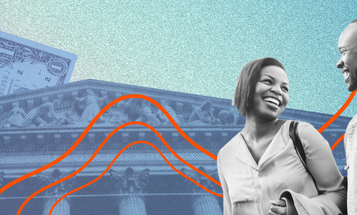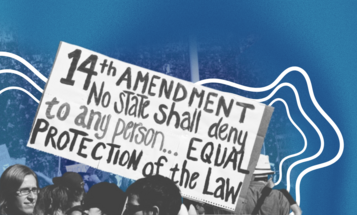
Inequality and Politics: An Interview With Nathan Kelly
Nathan Kelly is an associate professor of political science at the University of Tennessee. His book, The Politics of Inequality in the United States, examines how politics affects the market distribution of income, as well as government redistribution. Kelly and I discuss the implications of his work at the intersection of economic and political inequality.
Sean McElwee: Let’s start with your book, “The Politics of Income Inequality in the United States,” which argues that, “political dynamics have a systematic and predictable influence on distributional outcomes in the United States,” not only after transfers, but before transfers. You also find a similar result in three papers. Could you speak to the interplay of political and economic dynamics?
Nathan Kelly: The conclusion that I think my research supports is that politics works very much alongside economics in producing the distributional outcomes that we observe. Is it the case that economic inequality in any of its many forms is completely determined by political decisions? I think the answer to that is clearly no. But I think it's also equally clear that distributional outcomes are not completely outside the reach of politics and policy. I think both sets of explanations play a substantial role, and I think you see that in almost everyone's work if they take both economic and political explanations seriously when trying to explain inequality. You can look at policies like the progressive income tax or TANF [Temporary Assistance for Needy Families] that provide clear transfers between individuals and those like financial regulation that set the rules of the economic game and shape how markets function.
Both of these kinds of policy have distributional consequences. Those transfer policies shape the income distribution after the economic factors have done their work. The policies that shape markets are very much intertwined with economics. So my reading of things is that economic and political factors (probably in that order) work together to produce a "market" distribution of income, and then political and economic factors (again probably in that order) further shape distributional outcomes through redistributive policies. This is certainly not an either or proposition. The evidence is becoming pretty overwhelming that politics matters for economic inequality. And we never had much doubt that economic dynamics play a role.
SM: You co-authored a study with Peter Enns, in which you find that rising inequality does not lead to an increase in liberalism. There is also a study that finds people become more conservative after recessions, they are less likely to support the government helping the poor. Dan Ariely finds that most Americans believe inequality to be dramatically less than it is and want it to be lower, in the abstract. What does that mean for progressives in terms of talking about inequality?
NK: First off, I think we have a whole lot more to learn about why there is this over time association between rising inequality and increased conservatism. In my paper with Enns, we were very up-front about not really identifying the mechanism linking inequality to public opinion. So at first blush you might think that a progressive should shut up about inequality if there's a positive association between higher inequality and less support for redistribution.
But I'm not sure that's the message a progressive should take to heart. What I'm really curious about is why that correlation between rising inequality and conservatism exists. If it's the case that the observation of rising inequality is truly causing people to become more conservative, then progressives should be quiet about inequality. But I really doubt that's what's going on. My guess is that there is some other dynamic, by which inequality is really having some form of indirect effect on opinion. Here are a couple of ideas I'm curious about. First, it might be that some of the same factors that produced rising inequality - globalization, less progressive taxation, deregulation, dominance of the neoliberal economic model, etc. - made progressives more reticent to talk about and really support unabashedly progressive policies. They could have also become more reticent to openly support redistribution as more and more of their money came from the very wealthy. Regardless, if progressive politicians began to back off of some of their historically redistributive policy positions, it's likely that these shifting elite attitudes would send cues, particularly to their co-partisans in the mass public. This could erode support for redistribution. But we need a lot more information about elite rhetoric before this is anything more than an idea. A second possibility is that the basically uninterrupted rise in inequality over the past 40 years has helped to produce less confidence in government. So rising inequality, in this scenario, undermined support for government as the solution to the problem. Here, it is confidence in government that is key. Inequality may actually be the root cause, but it operates through trust in government. Either of these scenarios does not suggest that progressives should attempt obscure inequality or not talk about it. Rather, they should probably talk even more about it, and develop believable solutions to this problem but also a host of other problems that contribute to declining trust in government.
SM: Continuing on that study, you argue that the political system may respond equally well to the rich and poor – the problem may well be that the poor just have preferences that sometimes run contrary to their interests. There seems to be some support for this thesis in some of Gilens’ work (who finds that Bush was more responsive to American preferences than LBJ), but less so in Bartels, Seawright and Page (2013), Bartels (2014), and other Gilens (2009). Flavin (2009) also finds that the poor support redistributive policies. It seems that the main differences between Bartels and Gilens and many of his critics is the use of time-series versus a cross-sectional approach. Could you talk about that debate?
In that paper, we found a fairly strong association between rising inequality and conservatism. And this result was true for both the rich and the poor. As I mentioned above, we didn't really nail down the precise mechanisms that drive this correlation.
Our results in this paper are consistent with a growing body of research finding that the attitudes of the rich and the poor move together over time, even though the rich and the poor sometimes have very different preferences at one snapshot in time. And that's the issue with the time series versus cross-sectional approach to studying representation. Neither side of this debate has really fully grappled with the perspective from the other side. It may not even be possible for that to happen, but part of what's going on is a conceptual difference over what representation means. Those who look at cross-sectional evidence (very basically) see differences between the attitudes of the rich and the poor and note that government's outputs are more in line with the rich than the poor. They interpret that as unequal representation. Those who look at this over time see representation as a dynamic process - in which politicians don't respond to the static preferences of various groups at one point in time but instead shift their policy outputs as they sense changes in public opinion. And this side of the argument basically takes a snapshot of public opinion at a specific point in time as not very useful as a signal to re-election seeking policymakers. Under this view it's very important that the attitudes of the rich and the poor move together over time. Everybody is represented if representation is taken to be responsiveness to opinion shifts. The rich are much better represented if representation means alignment of outcomes with preferences stated on opinion surveys at any given point in time. It's really rooted in a conceptual disagreement about representation and how politicians process information about public opinion. I think it's hard for either side to fully engage with the other when the conceptual starting point is so different.
SM: In another study with Christopher Witko, you find that inequality is being shaped more and more at the state, rather than federal outcome. Coupled with your finding that states with higher levels of turnout inequality have policies that favor the wealthy seems to suggest that, at least at the state level, inequality is negatively re-enforcing. How can we break that cycle?
That idea that inequality is re-enforcing is something that has started to crop up again and again in my work. From less support to redistribution when inequality rises at the national level, to status quo bias in the policymaking system enhancing inequality more as inequality increases, it's a theme I'm starting to see more and more. At the state level, it strikes me as very important to mobilize lower income voters. There are tons of hurdles to doing this, but a more economically representative electorate seems in our work to equalize economic outcomes. But that isn't really the way policy change has been moving in most states, is it? Mobilizing labor is also an important aspect of this.
Unions are no panacea, but they fight for policies that are inequality-reducing in the aggregate, and they help to mobilize voters from lower-turnout groups. But, again, supporting the mobilization of labor isn't really the direction things have been going of late. But I also don't want to over-state the impact of state policies. We found an effect, but the effects of national-level policy are still much much more important for economic inequality than state level policies. But states do have some tools that they can use, particularly in the current federalism context.



